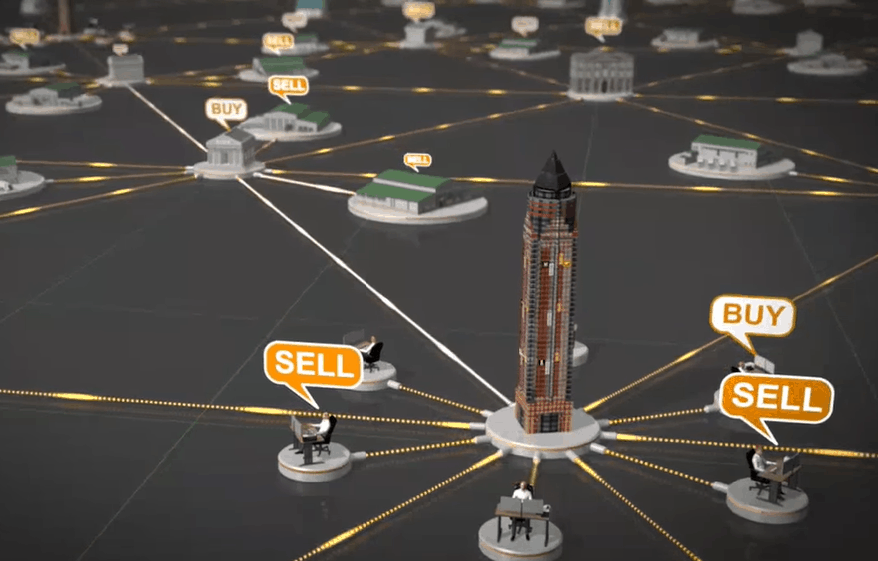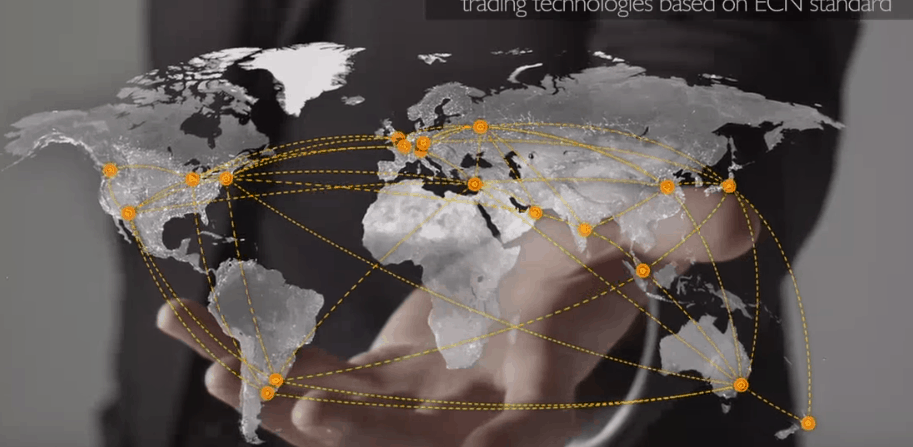Financial markets and their infrastructure are continuously developing. To stay current on the latest changes, traders need to search for and test new tools, expanding their trading arsenal. Unfortunately, such traders are few. Alongside with technical indicators, trading platforms and VPS servers, trading conditions also play a huge part in a trader’s performance.
Before reading the article and writing your questions in the comments section, I recommend to watch this video. It’s not long but covers the biggest part of questions on the topic.
ECN (Electronic Communication Network) is a communication network designed to provide a direct automated channel for sending trading orders from a client to a liquidity supplier. The idea of minimizing the number of intermediaries between two market players had been a hot topic of discussion for a long time. Lack of trust in brokers called for an effective and transparent solution.

The first independent ECN was introduced back in 1999. Since then, technology has made a big leap ahead, making ECNs much more accessible for traders. Nowadays, to trade via ECN, you simply need to open a special account with a broker. Opening and using such an account is as easy as opening a regular one. So why do most traders prefer to stick with regular accounts? Does ECN have enough advantages to attract traders? This article will give answers to these and other burning questions.
Table of Contents
Types of accounts
Let’s start with classifying the accounts which traders use to access the market.
- A regular account is the most popular type of account among traders. There is no unanimity on how exactly orders placed from regular accounts are processed. Some traders believe that orders are sent directly to liquidity suppliers and then processed in the market together with other orders. According to other traders, most orders stay inside a brokerage company that selects counteragents among its clients. For example, a broker has a client, who wishes to sell a certain asset, and another client, who wishes to buy the same asset. A broker brings their orders together by opening positions for both traders.
- PDF(No Dealing Desk) allows traders to place orders that are processed with no broker involved. NDD systems fall into two categories, ECN and STP. When it comes to ECN, orders are sent to an integrated market with no intermediaries. As for STP, bids are sent directly to a liquidity supplier, which is usually a bank. Depending on the size of an STP broker and volume of their contracts, it may work with one or more liquidity suppliers.
As you can see, a trader has a choice. You can use a regular account and hope that your broker doesn’t play against you by processing your orders inside their system. Or you can leverage the NDD technology and rest assured that the trading process is honest and transparent.
Trading conditions play a huge role in choosing a type of account. Regular accounts come with lower commissions and higher leverage. If you think about it, you can find a correlation between the attractiveness of trading conditions and how much a broker spends on servicing your account. A broker, who doesn’t have to send orders to the external market, has lower costs. Therefore, they can afford to provide more advantageous trading conditions to their clients as a thank-you for using their services. At the same time, brokers who put orders into an interbank market, have to bear additional costs. A trader is the one who has to cover such costs by paying higher commissions.
Our idea of how a regular account works is further confirmed by the fact that most user agreements make it clear that the broker doesn’t put orders into the external market. With that said, NDD accounts are a better choice since your orders are processed by a reliable and transparent system. Currenex is probably the most respectable company in the ECN industry. It was the first company to offer ECN services in 1999. With more than 15 years of expertise and flawless reputation, Currenex has earned the trust of millions of brokers.
How ECN works
Let’s break down how an ECN works and how orders are opened and processed. First, you create an order with certain parameters. A broker sends your order to the ECN they’re connected to. Major ECNs include Currenex (No.1 in North America), EBS (No.1 in Europe), IntegralFx, and JavaFX.
After your order has been placed in the network, the system finds a counteragent to fit your trading parameters. In this regard, the process is the same as when a broker processes orders within their network. The major difference is that an ECN uses an entire interbank liquidity pool to execute your order. It’s worth noting that being a part of an ECN is the prerogative of major institutions, such as large banks, state agencies, finance departments of top companies, etc. For example, Currenex works with such big names as Intel Corporation, Ericsson, and Autodesk, to name a few. Banks and corporations provide large amounts of liquidity which is more than enough to execute multiple orders. By trading via ECN, you have a chance to buy a small part of the USD pool from Intel or other major company.
The curious thing is that an ECN doesn’t carry out settlements between counteragents. Metaphorically speaking, an ECN is a notebook where encrypted data on incoming orders are stored. You can see these orders in the market depth chart. As soon as the system finds two suitable counteragents, they are asked to create payment orders. This way, a buyer and a seller make payment transactions directly between themselves, with no intermediaries involved.

Another important thing is that ECN services are impossible without clearing procedures and settlement banks. As mentioned earlier, all payment transactions are carried out directly between counteragents. However, there is a need to control such big flows of money. This is where cleaning companies come in. They are responsible for checking mutual obligations between counteragents. Following a clearing procedure, payment transactions are made via special banking organizations.
It’s easy to find out whether you have a real ECN account or a broker is making a fool of you. On its website or in its user agreement, a broker must provide the names of companies that are responsible for clearing and payment transactions. If this information is nowhere to be found, you have a good reason to doubt the integrity of your broker.
ECN: Pros and cons
Now let’s proceed to the most exciting part. Knowing the advantages and disadvantages of ECNs is crucial to making the right decision as to which type of account to choose.
Pros of ECN accounts:
- Speed.
If you’re using a regular account, executing your order may take up to several seconds. Any trader would say that this is a common practice. However, during high volatility, even a few seconds may be critical. A price may change drastically, and your order will get a requote, i.e. the system will refuse to open it due to the difference between the bid price and the current price. When it comes to an ECN, orders are processed instantly.
- No requotes.
This advantage is directly related to the previous one. Because orders are processed immediately, you can avoid a disappointing situation when your position can’t be opened due to a change in price. Requotes are especially dangerous for traders using scalping techniques on low timeframes. When it comes to scalping, a fast position opening is a crucial factor in a trader’s success. Even if you’re not a scalper but a straddle trader trading on the news, you must also understand the importance of split seconds between order placement and the actual opening of a position. During that short time, a price may change by several dozens of pips. As a result, you end up receiving messages that your position can’t be opened due to a changed price. If you don’t want to miss trading opportunities anymore, be sure to choose an ECN account over a regular one.
Because of a large number of traders, spreads are highly volatile and sensitive to any market event. With an ECN account, you can set the level of spread you want.
- Openness.
If you’re using a regular account, there is a high chance that your order won’t even reach the market. At the same time, an ECN makes sure that even one person or company can affect the market infrastructure. Your order immediately becomes a part of the market. While you can’t affect the market with 100 dollars in your account, you still become a part of the market, although a small one.
- Transparency.
Once registered in the system, any order becomes instantly available to all market participants. The biggest drawback of the Forex market is the lack of market depth charts that are available in markets specializing in stocks and other assets. By bringing traders together in one system, an ECN managed to make a decentralized market more controllable, in a good sense. For many traders, the fact that an ECN account offers a market depth chart may become a crucial factor in choosing between the two types of accounts.
- Big number of counteragents.
If you didn’t know how regular accounts worked, you’d probably find the name of this paragraph a little bit odd. It’s very common when your broker (or another trader, in the best scenario) is your only counteragent. This is where the conflict of interest comes in. If you’re using an ECN account, any authorized ECN participant may become your counteragent. As mentioned earlier, Currenex offers an impressive pool of counteragents, including top banks, governmental agencies, and 40 big-name companies.
- Reliability.
The very fact that an ECN involves such major players as banks and corporations is proof enough that it can be trusted. You can rest assured that you won’t lose your hard-earned money due to a conflict of interest.
As you can see, an ECN boasts a bunch of solid advantages. Each of these pros may urge you to switch to an ECN account shortly or even right now. However, you have to consider some drawbacks as well. Although few, these limitations may discourage you from becoming a part of an ECN.

Cons of ECN accounts
- Account size
If you’re a professional trader with more than 1,000 dollars in your account, the threshold amount won’t be a problem for you. If, however, your trading balance doesn’t exceed 300-500 dollars, you won’t be able to use an ECN account. Here is a word of caution to traders looking for brokers with the lowest threshold amounts. If the minimum required amount is several dozens of dollars (or even cents), you must be looking at a regular account disguised as an ECN account.
- Commission.
Unlike beginning traders, experienced traders understand that the trading possibilities of an ECN account cost money. Therefore, they’re willing to pay a $10-20 fee per closed position. The size of a commission is a great indicator of how trustworthy your selected broker is. If a broker charges you for opening and closing positions, it can be trusted. Such a broker isn’t interested in undermining your trading results by changing quotes or activating your stop losses.
How to choose an ECN account
Listed below are the factors to consider when choosing an ECN account.
- Broker.
When it comes to ECNs, choosing the right broker is of crucial importance. Finding an integral, trustworthy broker can be a challenging task. There is a high chance that you may end up with a regular account disguised as an ECN account. When looking for a good broker, be sure to pay attention to the following things:
- ECN.
If you can’t find the information about the ECN your selected broker is working with, it must raise your suspicion. A proper broker will never hide this kind of information.
- Clearing company.
Here is another way to find out whether your broker is connected to an ECN. As you already know, all transactions are processed by independent cleaning companies. A respectable broker will be eager to provide the information on the clearing companies it’s working with.
- Settlement bank.
Settlement bank is another organization an ECN broker can’t do without. Look for the information on the settlement bank your broker is partnering with.
- Trading account.
Be sure to check the following parameters: minimum deposit, leverage, selection of trading tools, spread, stop out, and commissions.
As you can see, the biggest difficulty when choosing an ECN account has to do with making sure that your selected broker is an honest company that provides a high level of services. Be sure to take ample time to check your selected broker. This is a surefire way to protect your money from swindlers and sleep well at night.
Bottom line
Experience and skills are not the only things that set a professional trader apart from an amateur one. A set of trading tools is no less important. To achieve ambitious goals, you need to have access to the best systems and techniques.
Many traders use a regular account without even knowing that their trading process can be organized more efficiently. An ECN account is a reliable and transparent solution with a bunch of undeniable advantages. With it, you can stop worrying about whether your broker is playing fair. Here is our tip to all traders out there: don’t be afraid to explore new trading opportunities. Be sure to choose the best tools and methods that will take your performance to a new level and fatten up your trading account!





